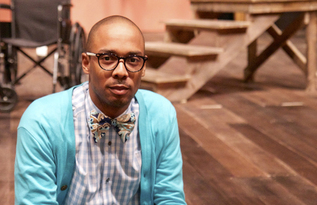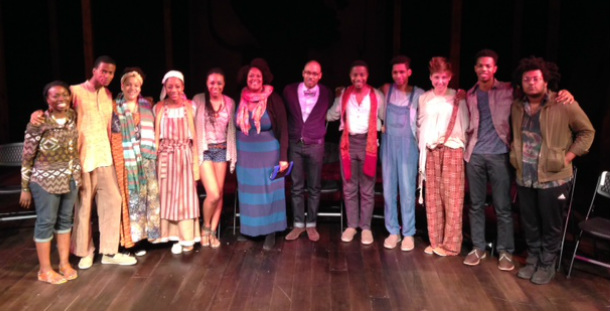|
“Ghosts hover where secrets are held in time: the secrets of what has been unspoken, unacknowledged; the secrets of the past; the secrets of the dead. Ghosts wait for the secrets to be released in time.” -- Alice Rayner, Ghosts: Death’s Double and the Phenomena of Theatre  This past Friday, I was invited to lead a post discussion for Insurrection: Holding History, which was presented as a co-production by Georgetown University Theatre and Performance Studies and the Black Theatre Ensemble. Here's how the university's describes the play: "Moving like a bullet through time, Robert O’Hara’s Insurrection: Holding History traffics in spirits and ghosts to offer a wickedly witty romp through America’s history. A contemporary African-American graduate student confronts the specter of his 189-year-old great-great grandfather, as well as Nat Turner, the subject of his graduate school thesis on American slave insurrectionists. Engaging questions about who has the right to tell history and what kinds of stories get remembered and recorded, this challenging and provocative work has been hailed by Tony Kushner as “a gorgeous, fresh and vital play from a very exciting playwright.” The panelists included director Isaiah Matthew Wooden and his wonderful cast: Omolade Wey, Demetrius Cooper, Allison Hilton, Danielle Lomas, Lisette Booty, Jacqueline Lawton, Isaiah Matthew Wooden, Isayah Phillips, CeeJay Hayes, Mersadies Burch, Walter Kelly, and Nehemiah Markos. I first saw Insurrection: Holding History back in 2007 when Theater Alliance produced it under the direction of Timothy Douglas. I thoroughly enjoyed seeing it again and it was wonderful speaking with the cast about their process. Many of the students were performing for the first time and a handful of them weren't even theatre majors. Those who weren't had been encouraged to audition by friends and spoke about how they fell in love with the play and their characters, and knew that they had to be in the play. They were enthusiastic to bring these characters to the stage and to share their history and culture with others. When I returned home, I compared my notes from that previous production to this one and noticed the similarities. At that time, I asked:
This time, I asked similar questions, but also meditated on a question that I'd been wrestling for a few weeks: As an African American woman, I face a number of challenges, but enjoy certain freedom and independence because of the achievements, failures, struggles, and sacrifices of those who came before me. As an artist, I believe it is my responsibility to tell the stories of my ancestors and community. I believe this is the role of all artists. But how do we do this? How do we hold history, honor legacy, forgive sins of the past, and establish trust so that we can stay informed and work in solidarity toward progress? The only answer I have is that we come together in dialogue with a willingness to listen and learn, and that we do so with patience, grace, and humility. This may not feel like action or progress, but I think it would begin the process of healing. And healing is what we truly need. The anger, guilt, and shame that plagues race relations in this country have held us back and fueled decades of violence. I imagine I'll keep coming back to this question ... but I hope to do so with better clarity. For now, please enjoy these production photos and also excerpts from Isaiah Matthew Wooden's wonderful and insightful director's notes. Director's Notes"At once poignant and evocative, Insurrection: Holding History traffics in ghosts—ghosts that hover and wait. T.J., Ron’s 189-year-old great-great-grandfather, a wheelchair-bound former slave who can move nothing on his body except his left eye and the middle toe on his right foot, is a trace of the past’s unfinished business. Hauntingly, he gives flesh to histories unspoken and unacknowledged: histories of the past, histories of the dead. T.J.’s insistence that Ron, who, in the play, is symbolic of the future, take him back to the 1830s plantation in Southhampton County, Virginia where he was witness to the planning of Nat Turner’s rebellion against the brutalities and indignities of U.S. slavery—home—makes eloquent and evident the demands that the past often makes on the present and future. Indeed, T.J. and the spectral Mutha Wit, who gives voice to him, hover precisely because secrets of the past are waiting to be released in time. Powerfully, Insurrection blurs, blends, and bends time to imagine myriad histories that have gone unrecorded or unremarked. Ron uncovers all sorts of absented realities while maneuvering and attempting to manipulate the past in the play, including the presence of Hammet, a slave and deputy to Nat Turner who excites Ron’s romantic desires. Ron and Hammet’s romance recalls the ghosts of many queer relationships absented from the archive. Indeed, Insurrection queers the space of history by placing their same-sex desires center stage. Additionally, through experimentations with form, language, spectacular plotting, queer aesthetics, and a ludic engagement with time, the play theatricalizes the performativity of history itself. In so doing, it raises several important questions: notably, What ishistory? Who has the right to tell history? Who determines what kinds of stories get documented or recorded?"  Isaiah Matthew Wooden is a director-dramaturg and Ph.D. Candidate in Theater and Performance Studies at Stanford University. His critical writing has appeared in academic journals such as Callaloo, Southern Studies, Theatre Journal, and Yale’s Theater and on popular sites such as The Huffington Post, The Feminist Wire, and NewBlackMan (in Exile), among others. Isaiah received his Bachelor’s degree in Government from Georgetown University, where, from 2005-2008, he served as an adjunct faculty member and the Artistic Advisor to the Black Theatre Ensemble. An active theater practitioner, Isaiah’s recent directing credits include: Wit by Margaret Edson; A Raisin in the Sun by Lorraine Hansberry; Fabulation, or the Re-Education of Undine by Lynn Nottage; The Gospel at Colonus by Lee Breuer and Bob Telson; Bulrusher by Eisa Davis; No Child… by Nilaja Sun; Dead Man’s Cell Phone by Sarah Ruhl; and, Beyond My Circle. A recipient of the 2014-2015 Ford Foundation Dissertation Fellowship, Isaiah is currently a Guest Artist in Theater and Performance Studies at Georgetown University.
0 Comments
Your comment will be posted after it is approved.
Leave a Reply. |
My BlogI'm a playwright, dramaturg, and teaching artist. It is here where you'll find my queries and musings on life, theater and the world. My posts advocate for diversity, inclusion, and equity in the American Theatre and updates on my own work. Please enjoy!
Categories
All
Archives
June 2020
Reading List
|


